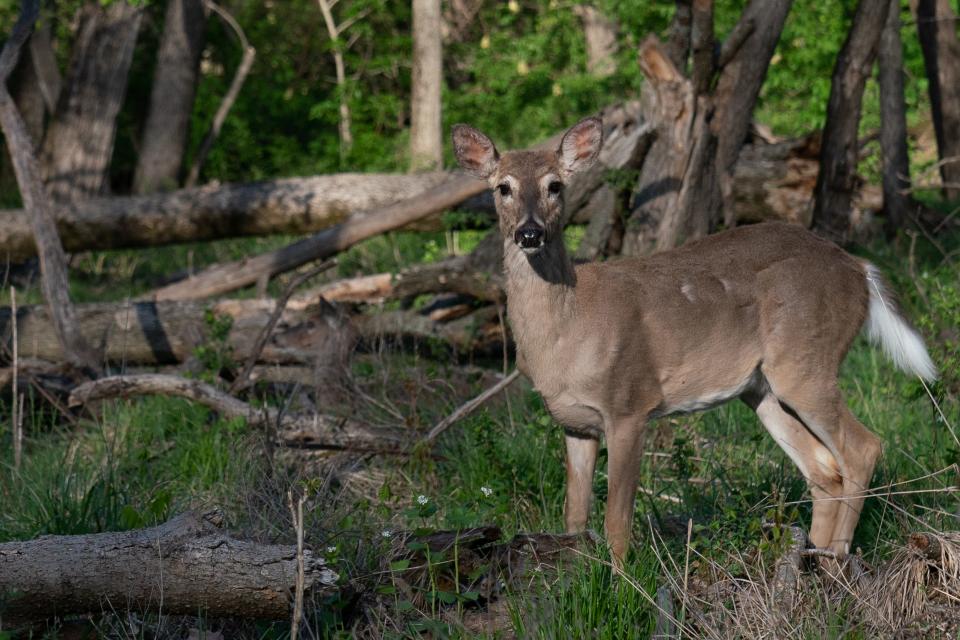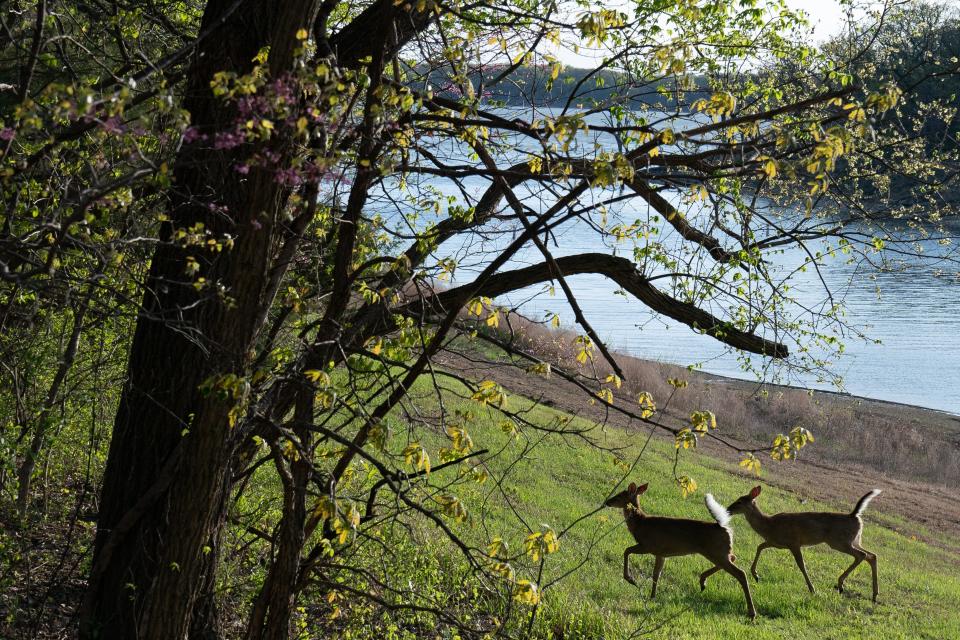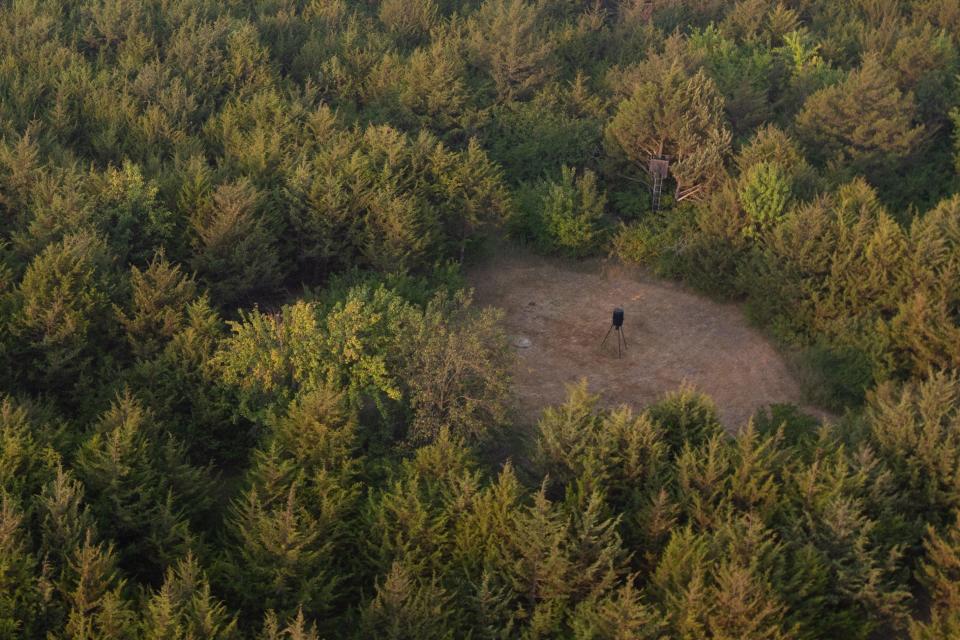Should Kansas ban deer baiting? Chronic wasting disease, fair chase raise hunting concerns
- Oops!Something went wrong.Please try again later.
Kansas officials are set to have an informational briefing on a controversial hunting topic — whether deer baiting should be banned or restricted.
The issue stems from wildlife biologists and disease experts expressing concern that baiting wildlife is contributing to disease transmission, particularly chronic wasting disease.
Here's what to know.
Kansas is having informational meeting on deer baiting
The Kansas Department of Wildlife and Parks explores issues surrounding deer baiting.
"Department biologists and members of the scientific community will continue to solicit input from the public, as well as share the latest in scientific research and best management practices," KDWP spokesperson Nadia Marji wrote in a news release.
The first in a series of information forums is 6:30-8:30 p.m. Thursday in the Leadership Studies Building on Kansas State University's campus in Manhattan. K-State Research and Extension staff will serve as moderators.
"That's why we're having the public meetings, maybe we'll learn something as to why we shouldn't be feeding wildlife," said Commissioner Troy Sporer, of Oakley, during a commission meeting this month.
Staff has said additional meeting dates and locations haven't been finalized. The plan is for at least two more forums with potential locations at universities in southeast Kansas, Wichita and Hays.
The meetings are expected to be recorded and available afterward but not livestreamed.
Deer baiting is currently allowed, but not on public land

Kansas already has a regulation, KAR 115-8-23, banning baiting on public lands.
"It's prohibited now on public lands, so the lands of the agencies control don't allow baiting out there," said Dan Riley, chief counsel at KDWP.
Baiting wildlife remains legal on private land.
Kansas doesn't currently plan to ban baiting on private land
Agency officials have said that while baiting will remain a regular discussion item, there are no regulation changes in the works.
"You won't see it in the form of a regulation anytime soon," Riley told lawmakers on the Joint Committee on Administrative Rules and Regulations in July.
State government is more likely to take an educational approach toward baiting on private land.
"We want the people that are out there who are engaging in that sort of baiting activity — myself as an example — to be aware of what the consequences are," Riley said. "What we hope to be able to do is to make that information known to everybody that would like to see it and also make some recommendations about ways that people can make sure that their animals are fed without creating the kind of hazard that dumping a bucket of corn on the ground does, basically.
"It's intended to be educational, and hopefully we'll have some suggestions that help eliminate the problem."
Commissioner Phillip Escareno, of Garden City, said potential regulatory action "is not anywhere near on the radar." If anything were to happen, it could be years from now.
"We're just hearing information with regards to helping us later on down the road," he said during the Sept. 7 commission meeting. "You'll know way ahead of time if we're going to vote, and you'll be able to come and make your comments and make your phone calls and all that kind of stuff at that time."
Chronic wasting disease has experts concerned about baiting
Riley told politicians at the July 10 meeting that presenters from other wildlife management agencies presented information to the Kansas Department of Wildlife and Parks Commission.
"I'm a deer hunter and a person that has baited deer for several years, and I was kind of shocked at some of the information presented," Riley said. "It has to do with disease transmission, and apparently the chronic wasting problem that's affecting a lot of the deer herd nationwide is made much worse by the baiting because it concentrates deer unnaturally and causes them to group up around the feed source."
It's not just chronic wasting disease, or CWD, said Charlie Bahnson, a wildlife veterinarian at the North Dakota Game and Fish Department, at that June 22 commission meeting. There are also epizootic hemorrhagic disease, brucellosis and bovine tuberculosis — which can be transmitted between wildlife and livestock — as well as potential unknown diseases.
Deer baiting and feeding are a source of deer unnaturally congregating and promote interactions among deer, such as face-to-face contact, that increase the likelihood of disease transmission, he said. Their bodily fluids can also get on the feed and transmit disease.
"Fundamentally, we understand that — whether we're talking about livestock or free-ranging wildlife or captive wildlife — if we concentrate animals, put them in really close proximity, we increase disease transmission," he said.
Bahnson said diseases are often detected late, which "behooves us ... to already maintain a social landscape that's less conducive to disease spread amongst our wildlife."
Not everyone thinks baiting is a major spreader of CWD
Supporters of deer feeding point to high rates of CWD in Midwest states that have banned baiting.
Clifford Shipley, a retired veterinarian who taught at the University of Illinois, said Illinois and Wyoming have never allowed baiting, yet they still have high rates of CWD.
"There's very little or no evidence, depending on who you believe, that the baiting drives the CWD," he said.

Shipley said social contact between deer is a source of disease spread, "but probably more CWD has been passed by man through hauling carcasses from one place to another, or release of deer."
Fair chase could also be a compelling argument to ban baiting
Shipley said he does not believe health concerns should be the main reason for banning baiting, and he likewise said he doesn't want to dictate ethics to other people.
But ethical concerns could be reason for some to support a bait ban.
"I have concerns about fair chase," said Sporer, one of the KDWP commissioners. "If we're going to do anything with this — we've all gotten roughed up over the last couple of weeks — maybe that's the start is look at the fair chase aspect of it."
Fair chase generally means ethical and sportsmanlike hunting of free-range animals that doesn't give the hunger an unfair advantage.
"My dad told the story that in the early '50s, there was a guy that drove out to his pasture every Saturday morning in a '57 Chevy and put out a bucket of corn at the same time every day," Sporer said. "And he did that throughout the summer and the fall. Come rifle season, he traded that five-gallon bucket of corn in for a .270."
Attorney General Kris Kobach supports deer feeding
If a regulation restricting deer baiting on private land were to ever be promulgated, KDWP would have to go through several steps, including getting the approval of the Kansas Attorney General's Office.
Attorney General Kris Kobach wants deer baiting to remain legal on private property.
"Deer feeding is so important to preserving the sport that we know and love," he said in an Aug. 17 video posted to Facebook.
The video was filmed on his farm at the edge of a soybean field where his youngest daughter shot her first deer. In it, Kobach asked 8-year-old Josie why she likes deer hunting.
"I like watching the deer, but I also like when you get scared when you're about to shoot them," Josie said.
"That nervousness you get, that's what we call buck fever, and I get it, too," Kobach said. "It's kind of an exciting feeling."
Kobach said from his experience training his daughters to hunt, "The key is making it exciting, you have to make it fun."
He said seeing deer from far away isn't hard to do in Kansas, but seeing them up close is exciting for young hunters. Reducing the distance of the shot also has the added benefit of increasing the chances of a successful hunt, which he said adds to the excitement.
"When Josie got her deer, we had a pile of corn that we put out in front of a double blind on the edge of this field about 50 yards out," Kobach said. "And it worked."

Josie said the deer would "eat and then look up at us."
"They're considering prohibiting us Kansas from ever feeding deer, meaning no more corn piles, no more feeders, no nothing," Kobach said. "They have some reasons, which I don't think are very strong ones."
Some baiting supporters have a financial stake
Commissioner Sporer said it had been a rough couple of weeks fielding phone calls.
"It really brings to light that the people that are most concerned about baiting are people that have financial gain in the business," he said. "I would encourage staff and commissioners to not get caught up in the money of this situation. I didn't become a commissioner to fight about money. I got on to be inspired about the resource."
Some bristled at that.
"Like it or not Troy, this is about money — money for you guys, not just us," said Will Cokeley, of Lawrence. "This operation doesn't happen without money, there is no Kansas Department of Wildlife and Parks without money. ... So I think you have to pay respect for the people who are trying to to earn money."
Kobach, who posted his Facebook video after a different commission meeting, also took issue with the notion that deer feeding is just for outfitters to make money.
"That told me that the Wildlife and Parks commissioners have never actually taught a young person to hunt," Kobach said. "It's really important to getting game in close for that experience that gets hunters thrilled about the sport. That's kind of sad and it almost, I don't know, but it seemed to me like maybe the majority of the commissioners weren't even hunters.
"So that lack of knowledge on their part inspired me to share this video. Because they have to understand that getting people engaged in hunting means hunting has to be fun. And for it to be fun, you got to have close encounters with deer."
Kobach said the numbers show fewer young hunters are replacing Baby Boomers as they retire from hunting.
"Hunting is a dying sport," he said. "And it was just so troubling to me to see that members of the commission just didn't know that being able to feed deer is not only important for the health of the deer herd, it's important for the health of hunting and for recruiting young people into hunting."
KDWP commissioners have heard lots of feedback
Commissioner Escareno, of Garden City, said he has heard lots of feedback.
"I do appreciate the comments, the feedback that we're receiving," he said. "It does help educate us as commissioners."
But, he added, "Sometimes enough's enough when you start to receive 20 and 30 calls a day."
"You've picked the hottest topic," said Shipley, the retired University of Illinois veterinarian. "Deer hunting stirs emotions in people that I don't even see in politics or religion."
Bahnson, the North Dakota veterinarian, said wildlife officials are obligated to engage with the issue, even if it is not fun.
"This issue is pretty charged," he said. "It generates a lot of pretty strong emotional responses and frankly it's not very fun to deal with, from an agency standpoint."
Escareno praised the quality of deer hunting in Kansas, but said precautionary measures may ultimately need to be taken to preserve deer for youth hunters.
"That's our job," he said.
Jason Alatidd is a statehouse reporter for the Topeka Capital-Journal. He can be reached by email at jalatidd@gannett.com. Follow him on Twitter @Jason_Alatidd.
This article originally appeared on Topeka Capital-Journal: Kansas board discusses hunters' deer baiting amid CWD spread concern

